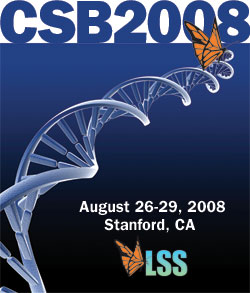Efficient haplotype inference from pedigrees with missing data using linear systems with disjoint-set data structures
Xin Li, Jing Li*
Department of Electrical Engineering and Computer Science, Case Western Reserve University, Cleveland, OH 44106 USA. jingli@case.edu
Proc LSS Comput Syst Bioinform Conf. August, 2008. Vol. 7, p. 297-308. Full-Text PDF
*To whom correspondence should be addressed.

We study the haplotype inference problem from pedigree data under the zero recombination assumption, which is well supported by real data for tightly linked markers (i.e., single nucleotide polymorphisms (SNPs)) over a relatively large chromosome segment. We solve the problem in a rigorous mathematical manner by formulating genotype constraints as a linear system of inheritance variables. We then utilize disjoint-set structures to encode connectivity information among individuals, to detect constraints from genotypes, and to check consistency of constraints. On a tree pedigree without missing data, our algorithm can output a general solution as well as the number of total specific solutions in a nearly linear time O (mn · α(n)), where m is the number of loci, n is the number of individuals and a is the inverse Ackermann function, which is a further improvement over existing ones. We also extend the idea to looped pedigrees and pedigrees with missing data by considering existing (partial) constraints on inheritance variables. The algorithm has been implemented in C ++ and will be incorporated into our PedPhase package. Experimental results show that it can correctly identify all 0-recombinant solutions with great efficiency. Comparisons with other two popular algorithms show that the proposed algorithm achieves 10 to 10 5 -fold improvements over a variety of parameter settings. The experimental study also provides empirical evidences on the complexity bounds suggested by theoretical analysis.
[ CSB2008 Conference Home Page ] .... [ CSB2008 Online Proceedings ] .... [ Life Sciences Society Home Page ]